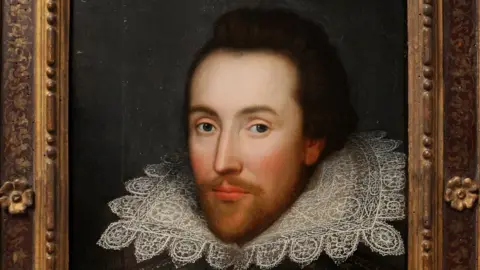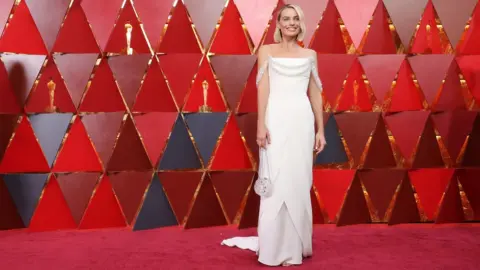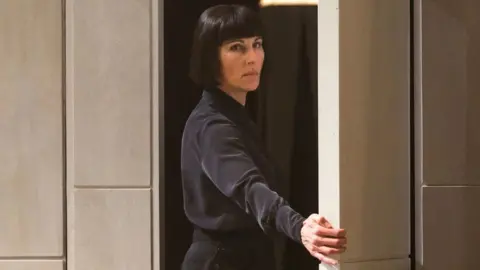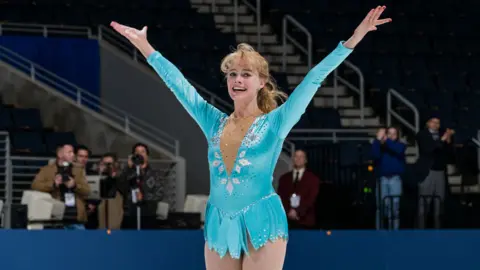Why Margot Robbie is taking on Shakespeare
 EPA
EPAMargot Robbie is planning a new TV series, which will give Shakespeare plays a "female perspective".
The Oscar-nominated actress is creating 10 standalone episodes with the Australian Broadcasting Corporation, each of which will tackle a different play.
The stories will be told from female points of view, with the series led by a predominantly female creative team.
"I'm taking a lot of meetings with the lesser-known talent at the moment, the indie film-makers, first- and second-time film-makers, mainly women," Robbie told the Australian Associated Press in Sydney.
"I'm in a lovely position where I can actually help get things greenlit so I want to work with people who we haven't seen yet."
Details are sketchy about which plays are going to be re-told for the series, but each of the 10 episodes will focus on a different work of Shakespeare, updated to comment on modern society.
"It's not a particularly new idea, but it's a welcome one," says Dr Abigail Rokison-Woodall, lecturer in Shakespeare and theatre at The Shakespeare Institute.
 Getty Images
Getty Images"People have been updating Shakespeare's plays in order to comment on contemporary situations for an awfully long time," she added. "There's a wealth of adaptations of Shakespeare, many of which take a feminist angle.
"And I think it's always interesting to see what people can do with the stories in terms of updating them."
'Stories that haven't yet been told'
Carol Rutter, professor of Shakespeare and performance studies at the University of Warwick, says Robbie's is an arguably better approach than some other recent interpretations.
"This project fits in at the moment with women's need, if you will, to take over Shakespeare," she says. "So in the UK we're seeing a lot of cross-gendering of roles, for example.
"And I think that's really destructive. I feel very keenly that cross-gendering is not the way to go, it creates all kinds of problems.
"I wish that women could simply do Shakespeare by being actors playing parts, being male or female as the part requires, but it seems to me that it's an odd skewing of a play when you take, for example, a Malvolio and turn it into a Malvolia.
"But Margot Robbie's project seems to be asking us to use the richness that is in Shakespeare's materials to explore the stories that haven't yet been told."
 Getty Images
Getty ImagesProf Rutter adds there is no shortage of such material to explore when it comes to expanding on certain female characters or storylines.
"There are all sorts of plays in Shakespeare where we would like to hear the women talk," she says - citing an off-stage conversation between Isabella and Mariana in Measure by Measure, which is key to the plot, as an example.
"All over Shakespeare there are women's stories that we would like to know so much more about."
Of course, Robbie's attempt to tell Shakespeare stories form a female perspective is built on the premise that they are currently told from male perspectives.
But interestingly, neither Prof Rutter nor Dr Rokison-Woodall think that is the case.
"I don't think one can say that about drama. I don't think drama is told from any one perspective because of course it's multi-vocal, that's what drama is," says Dr Rokison-Woodall.
"So I'm slightly mystified by the notion of needing to tell them from a female perspective. If this was a series of novels, I could completely understand what they were getting at.
"There are novels out there that retell plays from the perspective of a single character, but that's something a novel is able to do."
 NAtional Theatre
NAtional TheatreProf Rutter adds: "I think it's reductive to say that there is a default position that everybody who comes on to the stage is speaking for Shakespeare or speaking in a male voice.
"No, the women have voices, and the women are the most challenging voices that interrogate masculinity in the plays. So I don't hold that premise.
"However, because Shakespeare was working with an all-male company, and had probably three women to deploy play by play, I can understand why now these plays look, in terms of their personnel and their narratives, to be very male dominated. But I don't think the whole perspective is male."
Dr Rokison-Woodall says the effectiveness of taking a female point of view will entirely depend which plays are chosen for the TV series.
"In the tragedies, a lot of the female characters are silent to an extent, they are observers. Ophelia doesn't say very much, Gertrude doesn't say very much, although they're both in quite a lot of scenes in Hamlet.
"So to some extent I can see there's something attractive about retelling a Shakespeare play from the point of view of one of the characters who observes but doesn't speak much."
Whether or not the plays are currently told from a certain perspective, it's true that most of Shakespeare's protagonists are male.
 Neon
NeonAnd because so many of the plays are named after their lead characters, such as Macbeth, some have argued this alone gives them a distinctly male skew.
"Yeah but you see that's because they're not actually listening to the play," says Prof Rutter.
"All of Shakespeare's titles are mischievous. Twelfth Night. Macbeth. As You Like It. These titles are invitations to walk into the trap of thinking that these plays are actually about men.
"The first people on that stage [in Macbeth] are three weird sisters. They name the play Macbeth by putting the finger on him and we already know this man is already doomed, and doomed by these things that are the weird sisters."
She concludes: "I'm certainly positive about women remaking Shakespeare, I think that a fantastic thing to do. I just hope they are not just kind of remakes, but are genuinely new plays coming out of Shakespeare, and in the spirit of Shakespeare."

Follow us on Facebook, on Twitter @BBCNewsEnts, or on Instagram at bbcnewsents. If you have a story suggestion email [email protected].
